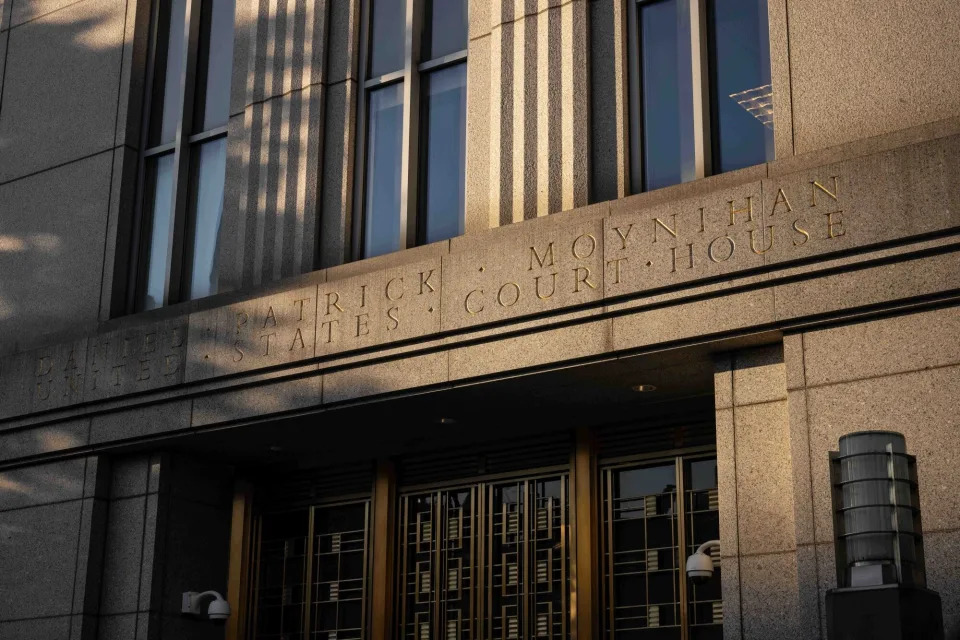SAM SPADE MEETS AI
Private Eye Gets Almost 7 Years for Hedge Fund Hacking RingChris Dolmetsch
Thu, November 16, 2023

(Bloomberg) -- A private investigator was sentenced in New York to 80 months in prison after he admitted to his role in a massive hacking ring that targeted hedge funds, short sellers and journalists.
Aviram Azari’s punishment was pronounced on Thursday by US District Judge John Koeltl in Manhattan. The 52-year-old Israeli had pleaded guilty in April 2022 to fraud and conspiracy to commit computer hacking, as part of a deal with US prosecutors.
Through an interpreter he expressed in Hebrew his “deep regret,” while noting he is worried for his relatives and friends in Israel, including his daughter, who is an officer in the Israeli Defense Force. Israel has been at war with Hamas forces in Gaza for more than a month.
“I take responsibility, full responsibility, for my actions,” Azari, dressed in tan prison garb, told the judge before his sentence was pronounced. He said he regretted it “with all my heart.”
Read More: Private Eye Pleads Guilty in Probe of Vast Hedge Fund Hack
Azari had admitted to hiring hackers who targeted victims with phishing emails. Prosecutors said he played a “critical role” in the scheme and was paid more than $4.8 million over almost five years to manage intelligence-gathering campaigns and attacks that can compromise entire networks. They said his clients included the now defunct German technology firm Wirecard AG.
His case was part of an investigation into a vast hacking-for-hire campaign that targeted thousands of entities including hedge funds Coatue Management LLC and Blue Ridge Capital LLC, as well as nonprofit groups fighting telecommunications companies over control of the internet and journalists from multiple news organizations.
He was arrested after landing at John F. Kennedy International Airport in September 2019 and has been in custody ever since.
Fought Hezbollah
Azar, who lives in Kiryat Yam, Israel, served as a paratrooper in the Israel Defense Forces, fought in the 2006 Lebanon War with Hezbollah and later worked as an undercover officer for the Israeli police. His lawyers said in a sentencing memo that his firm was at first a lawful business that allowed him to use his skills, before he turned down the wrong path.
“Mr. Azari was successful at growing his business,” they wrote. “He should have stopped there.”
The US had asked the judge to give Azari 94 to 111 months behind bars, saying the scheme was “incredibly sophisticated” and “wreaked financial, professional, emotional and physical devastation” on his victims. Prosecutors said in their own sentencing memo that his apprehension was a “difficult achievement” in international cybercriminal investigations and that his sentence should serve as a deterrent to would-be hackers.
They said he ran a firm known as Aviram Hawk, or Aviram Netz, that hired groups of hackers, including one based in India, to steal credentials through emails that appeared to be from trusted sources. Wirecard used his company to gather intelligence on people and financial firms that had been critical of it, they said.
“Mr. Azari was an essential link in the chain of what was a sophisticated and long-running hacking scheme,” Assistant US Attorney Juliana Newcomb Murray told the court. “The true scale of this crime is exponentially larger than the government has been able to confirm.”
Exxon Probe
Azari’s firm also targeted people and organizations fighting climate change, and stole documents that were leaked to the press, prosecutors said. That resulted in news articles about probes by New York and Massachusetts into Exxon Mobil Corp.’s knowledge of the risks of climate change that “appeared designed to undermine the integrity” of the investigations, the government said.
Prosecutors identified more than 100 victims successfully hacked by Azari, and about 200 other targets of projects managed by his firm. The number of hackers hired in the schemes numbered “in the thousands” and spanned the globe, the government said.
Three of Azari’s victims addressed him directly Thursday, including Peter Frumhoff, a Harvard University professor of environmental science and public policy, and Lee Wasserman, director of the Rockefeller Family Fund.
Frumhoff said the attacks targeting groups fighting climate change were “unnerving.” He said, “it forced me at a critical moment to become extremely wary about what emails were legitimate and which were not. I had no idea about what information had been compromised.”
Wasserman said he was “appalled and shaken” by the hack of his private emails. “It felt like Big Brother had arrived,” he said. “I found myself whispering in my own home.”
All of the victims urged Azari to give up the names of those who hired him.
“We have a right to know who the clients are,” Frumhoff said. “The public has a right to know who was paying Azari to carry out these attacks.”
Azari asked Koeltl to sentence him to five years in prison, saying he had endured a “simply unimaginable punishment” since his arrest. He said he had been held in “utterly inhumane conditions” at jails in Manhattan and Brooklyn, including a one-year lockdown in a “mold-infested, windowless cell” for more than 23 hours a day without showers, hot meals or exercise.
The case is US v. Azari, 19-cr-00610, US District Court, Southern District of New York (Manhattan).
(Updates with comments from victims.)
Most Read from Bloomberg Businessweek
No comments:
Post a Comment